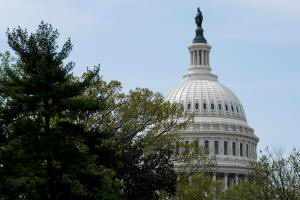US debt ceiling standoff talks look at COVID clawbacks, energy permits
 Send a link to a friend
Send a link to a friend
 [May 10, 2023]
By Richard Cowan and Katharine Jackson [May 10, 2023]
By Richard Cowan and Katharine Jackson
WASHINGTON (Reuters) - Talks on raising the U.S. federal government's
$31.4 trillion debt ceiling enter a new phase on Wednesday, after
Democratic President Joe Biden and top congressional Republican Kevin
McCarthy's first negotiating meeting in three months.
Time is tight to avoid a historic and economically destabilizing
default, which the Treasury Department has warned could come as soon as
June 1, but some areas of potential compromise emerged after Tuesday's
White House meeting.
Biden signaled an openness to Republicans' demand to claw back some
unused money for COVID relief, which is less than $80 billion. House of
Representatives Speaker McCarthy told reporters that Biden also
indicated a willingness to work on speeding up permitting for energy
projects, a goal that went unmet in 2022.
The White House has previously supported that idea.
Aides for Biden, McCarthy, top Democratic Senate Majority Leader Chuck
Schumer, top Senate Republican Mitch McConnell and top House Democrat
Hakeem Jeffries were to begin meeting daily, with another meeting
planned on Friday, both sides said.

"Default is not an option," Biden told reporters after Tuesday's
meeting. "I told congressional leaders I'm prepared to begin a separate
discussion about my budget."
Biden and opposition Republicans have been locked in a standoff for
months over the debt ceiling, with Democrats calling for a "clean"
increase without conditions to pay debts resulting from spending and tax
cuts approved by Congress.
House and Senate Republicans, meanwhile, have said they will not
authorize any additional borrowing without an agreement to cut spending.
McCarthy estimated that the two sides had as little as two weeks to
reach a deal that could then be passed by Congress.
[to top of second column]
|

The U.S. Capitol building is seen in
Washington, U.S., April 5, 2023. REUTERS/Elizabeth Frantz/File Photo

"I would hope he would be willing to negotiate for the next two
weeks so that we can solve this problem," McCarthy said.
Adding to the urgency, Biden is scheduled to leave on May 18 to
attend an annual meeting of the leaders of "Group of Seven" major
industrialized nations, though he said he would cancel that trip if
needed to avoid default.
"If somehow we got down to the wire and we still hadn't resolved
this ... I would not go. I would stay until this gets finished,"
Biden said.
But even if there is significant progress, the House and Senate each
have their own, often time-consuming procedures for advancing
legislation that opponents of any deal could use to slow things
down.
Few countries in the world have debt ceiling laws, and Washington's
periodic lifting of the borrowing limit merely allows it to pay for
spending Congress has already authorized.
Wall Street executives who have advised the U.S. Treasury's debt
operations for the past 25 years warned on Tuesday they were "deeply
concerned" about the debt limit impasse, which has markets worried
about a U.S. default on payment obligations.
The last time the nation got this close to default was in 2011 -
also with a Democratic president and Senate with a Republican-led
House.
(Reporting by Richard Cowan and Katharine Jackson; Additional
reporting by Moira Warburton; Editing by Scott Malone)
[© 2023 Thomson Reuters. All rights
reserved.]This material may not be published,
broadcast, rewritten or redistributed.
Thompson Reuters is solely responsible for this content. |